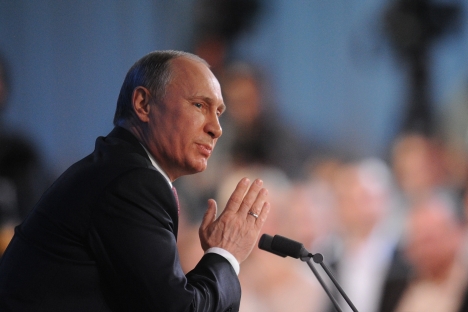
Vladimir Putin’s first major press conference indicates that he becomes more informal and sharp with journalists. Source: ITAR-TASS
Vladimir Putin’s first major press conference since returning to the president's desk turned out to be emotional and informal. The audience was tricky and in some ways hostile, but the president stood up to the blows. Experts noted that everyone came away pleased with each other, while Putin managed to send a message to the West that he does not have a chip on his shoulder.
Experts agree that the conversation turned out to be informal and sharp, with Putin demonstrating that, contrary to speculation, he is in good political shape.
The president took 60 questions, and within the first hour alone he had explained four times why Russia has responded to the “Magnitsky Act” by, among other things, forbidding Americans to adopt Russian children. For the first time, journalists dared to challenge the president – they did so by describing the Russian law as “cannibalistic.”
Gleb Fetisov, correspondent member of the Russian Academy of Sciences, pointed out that, this time around, the audience confronting the head of state was querulous and hostile, incensed as it was by the hasty ban on the adoption of Russian children by American families.
“However, midway through the conference, the aggressive mood subsided and the conversation proceeded in a businesslike manner,” experts said.
“Vladimir Putin and the journalistic community both came away pleased with each other. Journalists felt that they had given the president a hard time, while Putin felt he had engaged well with the media people,” said Aleksei Mukhin, head of the Political Information Center.
The experts’ opinions are borne out by journalists who managed to ask the president a question.
“This is the first time in my memory I had the impression that the questions were entirely spontaneous,” said Ekho Moskvy radio station’s anchor Inessa Zemler, who asked Putin about the “Dima Yakovlev law” in the first hour. “I deliberately put on a yellow jacket to catch his eye, but there were no guarantees that I would be allowed to ask my question.”
Most questions from foreign journalists (there were 200 of them, just as in 2008) came in the second half of the press conference. Aleksei Mukhin noted that Putin was more sympathetic toward the Asian media than their European and the American counterparts.
Gleb Fetisov also noted the preference for Asian journalists. For the first time, Putin voiced a commitment to strengthen investment cooperation with China and identified the main areas of economic cooperation between the two countries: high tech industries, nuclear power and aircraft manufacture.
Vladimir Putin’s emphasis on relations with Asian countries was not accidental, according to Aleksei Chesnakov, head of research at the Current Political Studies Center.
“There is a sense in the world that the center of economic development is shifting toward Asia. Russia cannot afford to miss its chance and should take this into account. In Europe, there is a discrepancy between its political influence and waning economic influence, and this discrepancy is likely to widen,” said Chesnakov.
As for the message to the West, analysts believe the president has demonstrated that Russia does not wish to be enemies with anyone, while upholding its national interests. Chesnakov believes Putin has promised that business will be treated with respect and political institutions will become more democratic, which is very important for investors.
Aleksei Mukhin also stressed that Putin has reiterated his adherence to former values and partners. However, the president made it clear that, although he bears a grudge against American lawmakers, Russian deputies have given a tough but adequate response to international challenges by passing the “Dima Yakovlev law.”
“The press conference has shown that the president is in good health, full of energy and plans for long-term development of Russia as a world power center along with China, the U.S. and Europe,” said Vyacheslav Smirnov, director of the Political Sociology Institute.
“The State Duma is threatening the Americans with law, but Putin said it is just a routine move in the relations with the U.S. – not a nuclear bomb, just a yellow card. He made it clear that he may or may not sign the law; because, unlike Barack Obama, Putin is not threatening, but merely taking the necessary self-defense measures. Anyway, the president’s answers sought to create that impression,” said Smirnov.
All rights reserved by Rossiyskaya Gazeta.
Subscribe
to our newsletter!
Get the week's best stories straight to your inbox